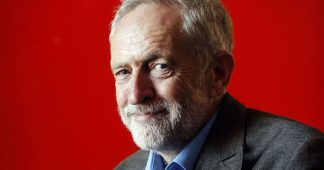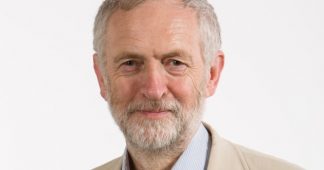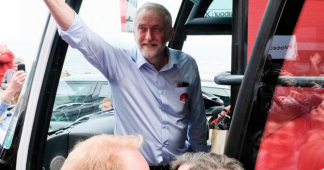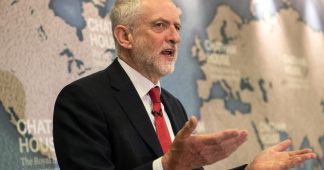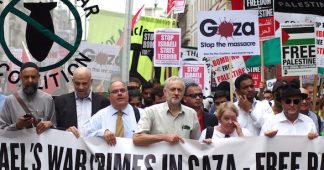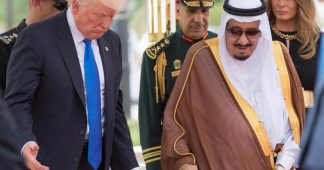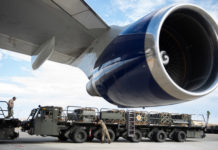Speaking on how to fight terrorism in the aftermath of the London Bridge attack on Sunday, UK Prime Minister Theresa May said that stamping out radical Islamist ideology is the number one priority, adding that “we cannot and must not pretend that things can continue as they are.”Terrorism, she said, “will only be defeated when we turn people’s mind away from this violence and make them understand that our values – pluralistic, British values – are superior” to that harbored by jihadists.
In addition to eradicating terrorist propaganda, military action “to destroy ISIS in Iraq and Syria” will be needed, as well as showing less tolerance to the manifestations of extremism at home, she said.
May’s Labour rival Corbyn, who has resumed his election campaign – briefly put on hold in the aftermath of the London carnage – pledged to empower police, granting them “full authority… to use whatever force is necessary to protect and save life,” and boost their numbers with 10,000 additional recruits, while taking aim at May for extensive cuts to the police force.
Echoing May’s concerns over radicalization, Corbyn said that the UK needs to have “some difficult conversations, starting with Saudi Arabia and other Gulf states,” who he blamed for “funding and fueling extremist ideology.”
Referring to a recent admission by the Home Office that it may never make public an inquiry delving into foreign funding of Islamist groups, which reportedly implicates Saudi Arabia, Corbyn blasted May for “suppressing the report.”
Speaking at a campaign rally on Friday, the Labour leader, known for his staunch anti-war stance, stated that by getting mired in military conflicts outside its borders, such as in Iraq and Libya, Britain invites blowback.
“Many experts… have pointed to the connections between wars our government has supported or fought in other countries and terrorism here at home,” Corbyn said. He added that merely pointing out the apparent link between the UK’s policy of meddling and terrorism on its own soil should in no way be interpreted as a justification for terrorism.
According to a YouGov poll, Corbyn’s explanation for the surge in terrorist attacks on British soil seems to strike a chord with people. Around 53 percent of the 7,134 UK citizens who were surveyed said they believe that the wars are at least in part responsible for terrorist attacks against the UK. Only 24 percent said that they do not see any connection, while another 23 percent said that they did not know.
Pilger: Terrorist attacks ‘product of UK foreign policy, of being where it shouldn’t be’
Author and documentary filmmaker John Pilger told RT’s Afshin Rattansi he believes that the interventionist British foreign policy of recent decades has backfired. Pilger spoke on RT’s ‘Going Underground’ ahead of the Saturday attack in London.
What terrorist attacks on British soil “have in common is that they are the product of the British foreign policy, of being where we shouldn’t be,” Pilger said.
He believes that the deadliest terrorist attacks in the UK in the 21st century, in particular the recent Manchester Arena attack and the 2005 London Underground bombings, demonstrate “that the rock of British foreign policy is briefly lifted and we see the cause and effect.”
Members of the ‘Libyan Islamic Fighting Group’ (LIFG), who claim to have played a key role in overthrowing Muammar Gaddafi’s regime, were allowed to travel unhindered across Europe when Theresa May was UK Home Secretary.
Terrorist attacks caused by foreign wars & police budget cuts – Corbyn https://t.co/etGRNgx3ta pic.twitter.com/MZIBjJIxnq
— RT (@RT_com) May 27, 2017
“When Libya, Africa’s largest producer of oil, was invaded, these salafists and wahhabists in Manchester, known as the Manchester boys, were told they could go to Libya… May was the country’s interior minister, responsible for control orders which were lifted by MI5. One of them talked about going to Heathrow Airport where he is stopped by counterterrorism police, and he gives them a name and a number in MI5, they call it and he sits there and waits, and they say, ‘Oh it’s fine, fine, off you go to battle,’” Pilger said, adding:
“They wanted to overthrow Gaddafi and these people were used.”
Once Gaddafi was removed in Libya, the “next stop” for those fighters, who were by then “at the very least Al-Qaeda affiliated,” was Syria.
“So many of the Manchester boys ended up in Syria fighting the West’s war or efforts to overthrow the government of Assad,” Pilger told Rattansi.
“It is a complicated story most certainly, but it has strands running through it, and the strongest strand is the support of powerful Western governments like the British government, the US government and the French government for what they call assets… This web of collaboration, proxy power in the Middle East invariably will produce this kind of violence and what we’ve seen since 9/11 is that the violence has come home, not only to the US but also to this country,” he said.
“We have to take responsibility for that, it has to be discussed, we can’t walk around with their hands over our eyes and their fingers in our ears, it’s absurd. The people who died in Manchester, and in the London Underground, and the people who died in the Twin Towers, and all those children in Yemen and Afghanistan deserve better.”
